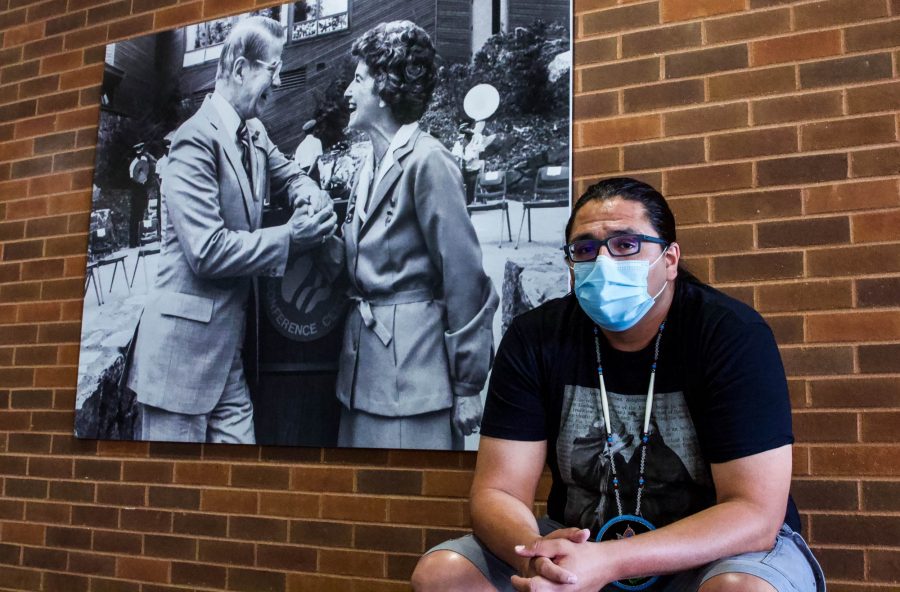Over 400 students, staff, faculty and community members have signed a July 15 petition calling for the Humphrey School of Public Affairs to “critically re-evaluate” their relationship with Hennepin County Attorney Mike Freeman, who sits on the Dean’s Advisory Council.
Many people have criticized Freeman’s handling of the George Floyd case, as well as other cases involving men of color and police. The petition calls for the University to also publicly share all financial ties between the Freeman family and the Humphrey School, and develop a transparent process to rename the Orville and Jane Freeman Commons, among other demands.
Orville Freeman was a Minnesota governor who, in the 1950s, approved the construction of the I-94 interstate – which ran through the Rondo neighborhood, the largest Black community in St. Paul at the time. The construction displaced around 650 families and demolished many local businesses and community buildings.
Ben Yawakie started digging into the Minnesota Historical Society archives to learn more about the Freeman family. The second-year graduate student, studying public policy and public health, said a speech Orville Freeman made stuck with him and prompted him to get involved with the petition.
When talking about the I-94 construction Freeman said, “In a democracy sometimes all of us must give way to the benefit of the majority, and if a highway runs through your property, why, you of course have to give way to the majority will.”
Having walked through and spent time in the Orville and Jane Freeman Commons, Yawakie said it makes him uncomfortable to think about honoring the Freeman family in this way, especially now knowing this historical context.
“Names have meaning, purpose and power,” he said. “It’s high time that we have an honest look at our history, and understand what those important people that have been leaders have done, both in a positive way but also what they’ve done in a negative way to impact our communities.”
Many of the students who led the petition said Mike Freeman’s handling of the Floyd case shows his values do not align with the principles the school stands for. Given that the advisory council is designed to build community and counsel the Dean, Yawakie said many students have lost faith in Freeman’s ability to uphold justice and provide sound judgement.
“Our mission talks about instilling, inspiring and educating future leaders to advance the common good in an ever-changing world,” he said. “If we keep perpetuating that harm and thinking, ‘Those are our heirs that we need to look up to,’ we need to have an honest revaluation of who we want to be and the ‘common good’ we want to bring out into the world as future policy leaders.”
Although the Humphrey School is one of the highest ranked graduate schools for public affairs in the nation, incoming master’s student Kate Ingersoll said she had some concerns regarding her future education.
After releasing the petition, it was opened up for comments and personal anecdotes, according to Ingersoll. Upon reading some of the petition’s comments, Ingersoll said she was concerned that discussions about race, class and gender might be seen as stand-alone topics in curriculum rather than incorporated into policy work itself.
Ingersoll said not talking about how structures of inequity are built and maintained through policies and historical institutions “giv[es] all of us a warped idea of the world we live in and the way we can approach problem solving around equity issues.”
Njoya Chomilo, a third-year graduate student, said race touches every policy field from transportation to energy policy, climate change, food insecurity, agriculture and home ownership. Without acknowledging the intersections of race, class and other systemic issues, Chomilo said policy work talks in pure theoretical terms which are disconnected from reality.
“If we want to send out really cutting edge policy makers, people who want to serve communities and make them better, and not just keep on repeating and trying broken tested policies which help no one, we should change the curriculum,” he said. “Until we do so and we actually acknowledge that, I feel like that ‘Top 10’ label is not earned by the Humphrey [School].”
Humphrey School Dean Laura Bloomberg said she recognized and valued the effort students put into drafting the petition. She wrote in an email to the organizers that said she would “consider carefully your recommendations, articulate clear intentions and outline a concrete proposed plan for moving forward” by early August.Bloomberg declined to comment further until she had spoken more in depth with the students.
Chomilo said students understand some of these systematic changes will not happen overnight. Even after he graduates, he said he will continue to advocate for future students because through this work they can improve communities.
“It’s easy for people to get caught up in an intellectualization of these challenges. But at the end of the day, we’re talking about racism that is deeply embedded and is deeply dehumanizing to people,” Ingersoll said. “We need to not just have this bloodless conversation about policy and best practice.”

















